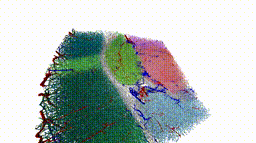# -*- coding: utf-8 -*-
"""
MMP
===
Interface to numpy memmaps
Note
----
For image processing we use [x,y,z] order of arrays.
To speed up access to z-planes memmaps are created in fortran order by default.
"""
__author__ = 'Christoph Kirst <christoph.kirst.ck@gmail.com>'
__license__ = 'GPLv3 - GNU General Pulic License v3 (see LICENSE.txt)'
__copyright__ = 'Copyright © 2020 by Christoph Kirst'
__webpage__ = 'http://idisco.info'
__download__ = 'http://www.github.com/ChristophKirst/ClearMap2'
import numpy as np
import ClearMap.IO.Source as src
import ClearMap.IO.Slice as slc
import ClearMap.IO.NPY as npy
import ClearMap.IO.FileUtils as fu
###############################################################################
### Source class
###############################################################################
[docs]class Source(npy.Source):
"""Memory mapped array source."""
def __init__(self, location = None, shape = None, dtype = None, order = None, array = None, mode = None, name = None):
"""Memory map source construtor.
Arguments
---------
array : array
The underlying data array of this source.
"""
memmap = _memmap(location=location, shape=shape, dtype=dtype, order=order, mode=mode, array=array);
super(Source, self).__init__(array=memmap, name=name);
@property
def name(self):
return "Memmap-Source";
@property
def array(self):
"""The underlying data array.
Returns
-------
array : array
The underlying data array of this source.
"""
return self._array;
@array.setter
def array(self, value):
if not isinstance(value, np.memmap):
array = np.asarray(value);
value = _memmap(location=self.location, array=array);
self._array = value;
@property
def dtype(self):
"""The data type of the source.
Returns
-------
dtype : dtype
The data type of the source.
"""
return self._array.dtype;
@dtype.setter
def dtype(self, value):
if np.dtype(value) != self.dtype:
self.array = np.asarray(self.array, dtype=value);
@property
def order(self):
"""The order of how the data is stored in the source.
Returns
-------
order : str
Returns 'C' for C contigous and 'F' for fortran contigous, None otherwise.
"""
return npy.order(self.array);
@order.setter
def order(self, value):
if value != self.order:
self.array = np.asarray(self.array, order=value)
@property
def location(self):
"""The location where the data of the source is stored.
Returns
-------
location : str or None
Returns the location of the data source or None if this source lives in memory only.
"""
return self._array.filename;
@location.setter
def location(self, value):
if value != self.location:
memmap = _memmap(location=value, shape=self.shape, dtype=self.dtype, order=self.order);
self.array = memmap;
@property
def offset(self):
"""The offset of the memory map in the file.
Returns
-------
offset : int
Offset of the memeory map in the file.
"""
return self._array.offset;
[docs] def as_virtual(self):
return VirtualSource(source=self);
[docs] def as_buffer(self):
return self._array
[docs]class VirtualSource(src.VirtualSource):
"""Virtual memory map source."""
def __init__(self, source = None, shape = None, dtype = None, order = None, name = None):
super(VirtualSource, self).__init__(source=source, shape=shape, dtype=dtype, order=order, name=name);
@property
def name(self):
return 'Virtual-Memmap-Source';
[docs] def as_virtual(self):
return self;
[docs] def as_real(self):
return Source(location=self.location, shape=self.shape, dtype=self.dtype, order=self.order, name=self.name);
[docs] def as_buffer(self):
return self.as_real().as_buffer();
@property
def array(self):
return self.as_real().array;
###############################################################################
### IO Interface
###############################################################################
[docs]def is_memmap(source):
if isinstance(source, (np.memmap, Source)):
return True;
elif isinstance(source, str):
if fu.is_file(source):
try:
memmap = np.memmap(source); #analysis:ignore
except:
return False;
return True;
else:
return False;
[docs]def read(source, slicing=None, mode=None, **kwargs):
"""Write data to a memory map.
Arguments
---------
sink : str, memmap, or Source
The sink to write the data to.
slicing : slice specification
Optional slice specification of memmap to read from.
mode : str
Optional mode spcification of how to open the memmap.
Returns
-------
source : Source
The read memmap source.
"""
if isinstance(source, Source):
if slicing is None:
return source;
else:
return source.__getitem__(slicing);
elif isinstance(source, np.memmap):
if slicing is None:
memmap = source;
else:
memmap = source.__getitem__(slicing);
return Source(array = memmap);
elif isinstance(source, str):
try:
memmap = _memmap(location=source, mode=mode);
except:
raise ValueError('Cannot read memmap from location %r!' % source);
if slicing is not None:
memmap = memmap.__getitem__(slicing);
return Source(array = memmap);
else:
raise ValueError('Cannot read memmap from source %r!' % source);
[docs]def write(sink, data, slicing=None, **kwargs):
"""Write data to a memory map.
Arguments
---------
sink : str, memmap, or Source
The sink to write the data to.
data : array
The data to write int the sink.
slicing : slice specification or None
Optional slice specification of an existing memmap to write to.
Returns
-------
sink : str, memmap, or Source
The sink.
"""
if slc.is_trivial(slicing):
slicing = (slice(None),);
if isinstance(sink, (Source, np.memmap)):
sink.__setitem__(slicing, data.array);
elif isinstance(sink, str):
if slicing == (slice(None),):
memmap = _memmap(location=sink, array=data.array);
else:
try:
memmap = _memmap(location=sink, mode='r+');
except:
raise ValueError('Cannot write slice into non-existent memmap at location %r!' % sink);
memmap.__setitem__(slicing, data.array);
else:
raise ValueError('Cannot write memmap to sink %r!' % sink);
return sink;
[docs]def create(location = None, shape = None, dtype = None, order = None, mode = None, array = None, as_source = True, **kwargs):
"""Create a memory map.
Arguments
---------
location : str
The filename of the memory mapped array.
shape : tuple or None
The shape of the memory map to create.
dtype : dtype
The data type of the memory map.
order : 'C', 'F', or None
The contiguous order of the memmap.
mode : 'r', 'w', 'w+', None
The mode to open the memory map.
array : array, Source or None
Optional source with data to fill the memory map with.
as_source : bool
If True, return as Source class.
Returns
-------
memmap : np.memmap
The memory map.
Note
----
By default memmaps are initialized as fortran contiguous if order is None.
"""
mode = 'w+' if mode is None else mode;
memmap = _memmap(location=location, shape=shape, dtype=dtype, order=order, mode=mode, array=array);
if as_source:
return Source(memmap);
else:
return memmap;
###############################################################################
### Helpers
###############################################################################
def _memmap(location = None, shape = None, dtype = None, order = None, mode = None, array = None):
"""Create a memory map.
Arguments
---------
location : str
The filename of the memory mapped array.
shape : tuple or None
The shape of the memory map to create.
dtype : dtype
The data type of the memory map.
order : 'C', 'F', or None
The contiguous order of the memmap.
mode : 'r', 'w', 'w+', None
The mode to open the memory map.
array : array, Source or None
Optional source with data to fill the memory map with.
Returns
-------
memmap : np.memmap
The memory map.
Note
----
By default memmaps are initialized as fortran contiguous if order is None.
"""
#print location, shape, dtype, order, mode, array
if isinstance(location, np.memmap):
array = location;
location = None;
if array is None:
if not isinstance(location, str):
raise ValueError('Cannot create memmap without a location!');
if mode != 'w+' and fu.is_file(location):
array = np.lib.format.open_memmap(location);
if array is None:
if shape is None:
raise ValueError('Cannot create memmap without shape at location %r!' % location);
mode = 'w+' if mode is None else mode;
fortran = order in ['F', None]; #default is 'F' for memmaps
memmap = np.lib.format.open_memmap(location, mode=mode, shape=shape, dtype=dtype, fortran_order=fortran);
elif isinstance(array, np.memmap):
location = location if location is not None else array.filename;
location = fu.abspath(location);
shape = shape if shape is not None else array.shape;
dtype = dtype if dtype is not None else array.dtype;
order = order if order is not None else npy.order(array);
#if shape != array.shape:
# raise ValueError('Shape %r and array shape %r mismatch!' % (shape, array.shape));
if shape != array.shape or dtype != array.dtype or order != npy.order(array) or location != fu.abspath(array.filename):
fortran = order in ['F', None]; #default is 'F' for memmaps
memmap = np.lib.format.open_memmap(location, mode='w+', shape=shape, dtype=dtype, fortran_order=fortran);
if shape == array.shape:
memmap[:] = array;
else:
memmap = array;
if mode is None:
mode = 'r+';
if mode != memmap.mode:
memmap = np.lib.format.open_memmap(location, mode = mode);
elif isinstance(array, np.ndarray):
if not isinstance(location, str):
raise ValueError('Cannot create memmap without a location!');
shape = shape if shape is not None else array.shape;
dtype = dtype if dtype is not None else array.dtype;
order = order if order is not None else npy.order(array);
if shape != array.shape:
raise ValueError('Shape %r and array shape %r mismatch!' % (shape, array.shape));
fortran = order in ['F', None]; #default is 'F' for memmaps
memmap = np.lib.format.open_memmap(location, mode='w+', shape=shape, dtype=dtype, fortran_order=fortran);
memmap[:] = array;
if mode is None:
mode = 'r+';
if mode != memmap.mode:
memmap = np.lib.format.open_memmap(location, mode=mode);
else:
raise ValueError('Array is not a valid!');
return memmap;
###############################################################################
### Tests
###############################################################################
def _test():
import ClearMap.IO.MMP as mmp
#reload(mmp);
m = mmp.Source(location = 'test.npy', shape = 4)
print(m)
m[:] = 5;
print(m)
import ClearMap.IO.Slice as slc
s = slc.Slice(source = m, slicing = slice(1,3));
print(s)
s[:] = 3;
print(s)
print(m)
#
#
#
#
# #extract info from source if given
# if isinstance(location, src.Source):
# shape = source.shape;
# if dtype is None:
# dtype = source.dtype;
# if order is None:
# order = npy.order(source);
# if location is None:
# location = source.location;
# #elif isinstance(source, np.ndarray):
#
#
# memmap = read(location=location, mode=mode);
#
#
# if shape != memmap.shape or dtype != memmap.dtype or order != order:
#
# memmap = create()
#
# else:
# if shape is None and dtype is None and order is None:
#
# raise ValueError('No way to initialize the source, a location is needed!')
# memmap = create(location = location, shape = shape, dtype = dtype, order = order, mode = mode, source = array, as_source = False);
#
#
#
#
#
# #write data if given
# if isinstance(source, src.Source) and source.array is not None:
# memmap[:] = source.array;
# elif isinstance(source, np.ndarray):
# memmap[:] = source;
#
# if as_source:
# return Source(array = memmap);
# else:
# return memmap
#class Source(np.memmap):
# """Memory map source class"""
#
# def __new__(cls, filename, shape = None, dtype = None, order = None, mode = None):
# if isinstance(filename, np.memmap):
# self = filename;
# elif fu.is_file(filename):
# self = read(filename, mode = mode);
# else:
# self = create(filename, dtype = dtype, shape = shape, order = order, mode = mode);
# self = self.view(cls);
# return self;
#
# def name(self):
# return "Source-Memmap";
#
# @property
# def order(self):
# return npy.order(self);
#
# @property
# def array_strides(self):
# return tuple(np.array(self.strides, dtype = int) / self.itemsize);
#
# def array(self, *args, **kwargs):
# return self.view(np.memmap);
#
# def __str__(self):
# if hasattr(self, 'filename') and self.filename is not None:
# info = '{' + self.filename + '}';
# else:
# info = '';
#
# dtype = self.dtype;
# if hasattr(dtype, 'name'):
# dtype = dtype.name;
#
# return "%s%r[%r]%s" % (self.name(), self.shape, dtype, info);
#
# def __repr__(self):
# return self.__str__()

 Source
Source


